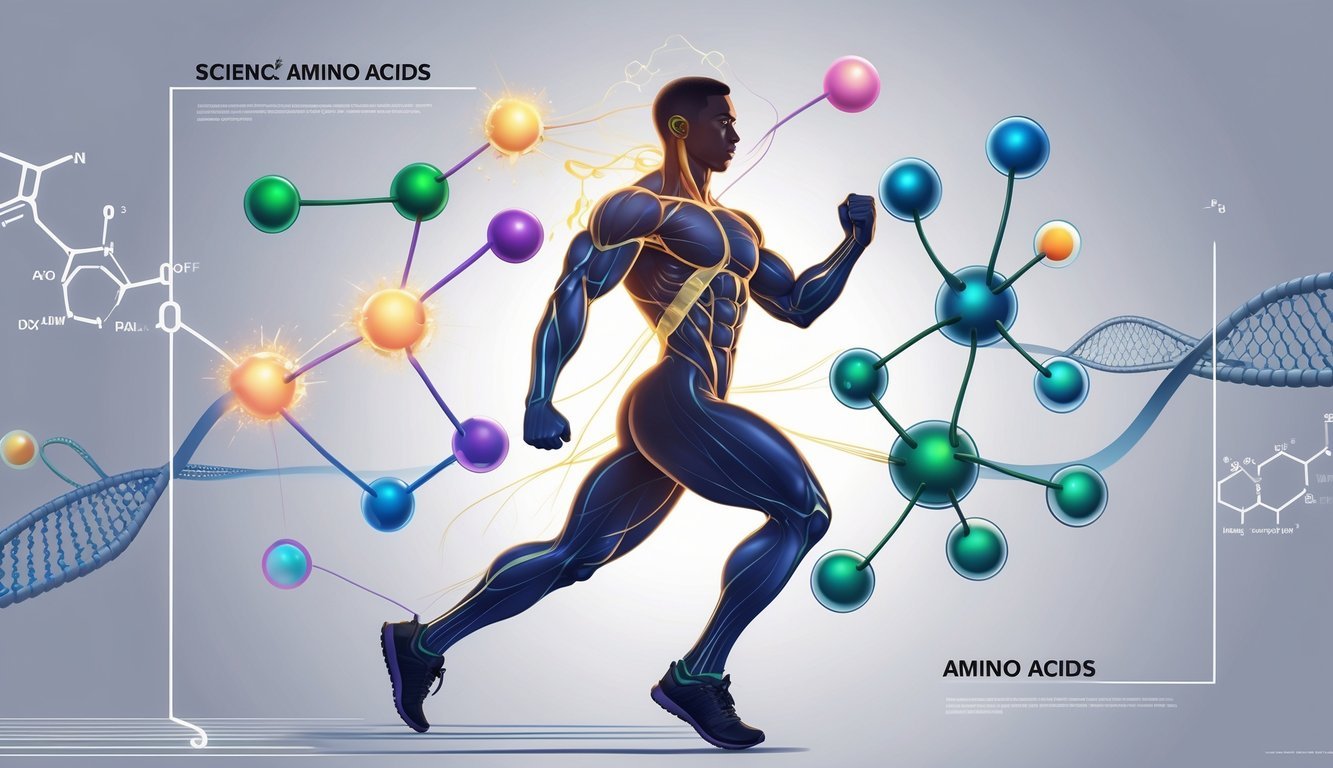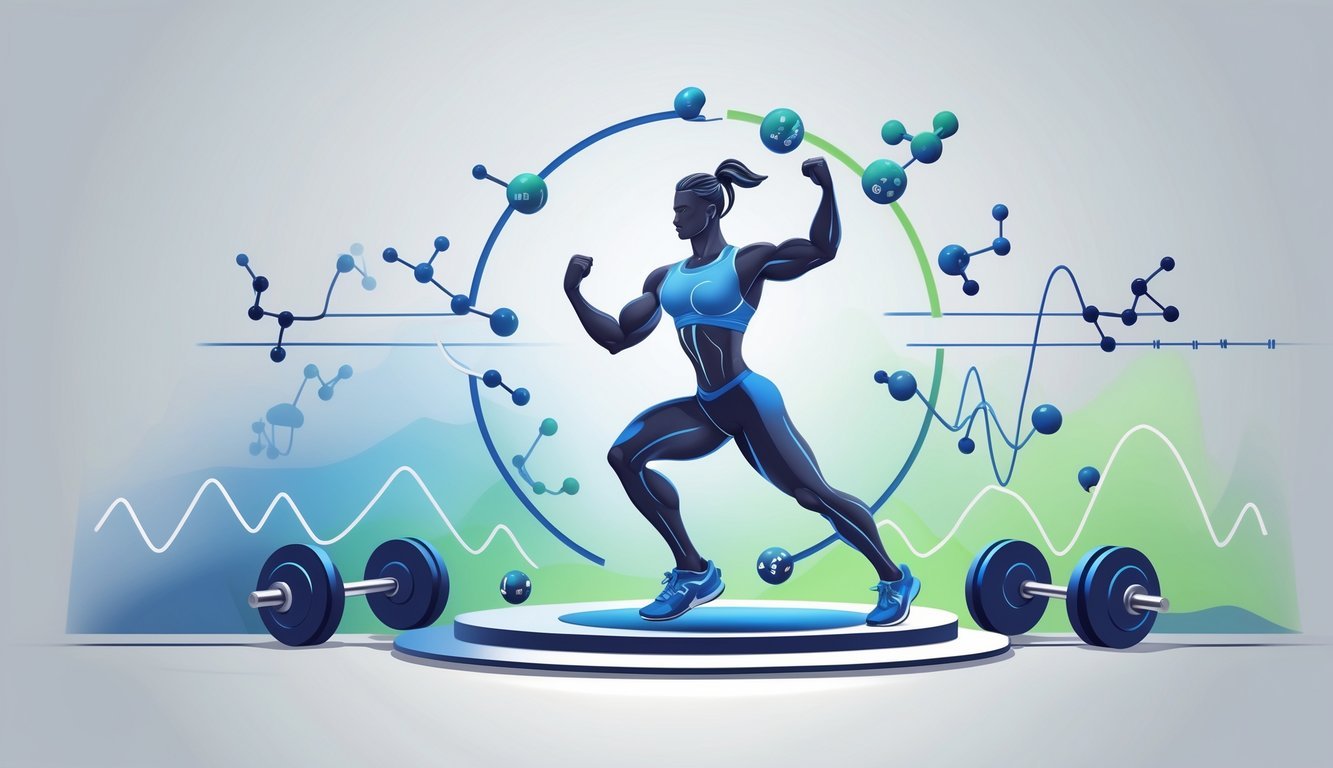Physical Address
304 North Cardinal St.
Dorchester Center, MA 02124
Physical Address
304 North Cardinal St.
Dorchester Center, MA 02124
Amino acids are crucial for muscle repair, energy, and recovery during workouts. Essential amino acids support fitness performance, while branched-chain amino acids enhance endurance and reduce fatigue.

Amino acids matter a lot for your workouts and how you recover.
They’re the tiny building blocks that make up proteins, which help repair your muscles and provide energy.
These 11 key amino acids can really improve your fitness performance and support muscle growth.
Your body can make some amino acids, but you need to get the essential ones from food or supplements.
Leucine, valine, and isoleucine stand out for muscle repair and energy.
If you know which amino acids to focus on, you can plan your nutrition for better workouts.
Learning how these amino acids work leads to better stamina, less fatigue, and faster recovery.
Understanding the key amino acids helps you boost your fitness results and feel stronger during training.

Amino acids help your body build muscle, recover from exercise, and perform during workouts.
You get some from your diet, while your body makes others.
Knowing which amino acids matter most can help you pick the right foods and supplements for your goals.
Your body uses 20 amino acids to build proteins, but only 9 are essential.
You can’t make these, so you have to get them from food.
Essential amino acids help build muscle tissue and create enzymes and hormones.
Your body makes non-essential amino acids on its own.
They still help with muscle repair and metabolism, but you don’t have to worry as much about getting them from food.
If you focus on essential amino acids, you’ll have the building blocks you need for muscle growth and recovery, especially if you do resistance training or tough workouts.
Leucine, isoleucine, and valine are branched-chain amino acids (BCAAs).
Your muscles use these directly during exercise.
BCAAs can lower muscle damage and soreness, delay fatigue, and help your performance.
Leucine is especially important because it kicks off protein synthesis—basically the start of muscle building.
A lot of athletes take BCAA supplements to boost recovery and muscle growth after workouts.
You can also get them from protein-rich foods like meat, dairy, and eggs.
Protein synthesis means your body is building new muscle proteins.
Essential amino acids are required for this process.
Without enough, your muscle repair and growth slow down.
Leucine stands out by turning on enzymes that start protein synthesis.
After you exercise, your body increases this process to fix damaged muscle.
Overall protein intake matters too.
Eating enough protein with all the essential amino acids helps you build and keep muscle, especially if you lift or train a lot.
You can get essential amino acids from many protein-rich foods.
Think:
If you’re vegetarian or vegan, you’ll need to plan meals to cover all essential amino acids.
Pay attention to your total protein and calorie needs, depending on how active you are.
Many athletes use protein powders or amino acid supplements to boost intake without adding too many calories.
A dietitian can help you create a nutrition plan that fits your goals and diet.
That way, you’ll see better exercise results and recover faster.

Certain amino acids really make a difference for muscle growth, energy, and recovery.
These building blocks support your muscles, immune system, and your overall exercise results.
Leucine stands out for muscle growth.
It directly triggers protein synthesis, which is how your body builds new muscle tissue.
That makes leucine essential if you want to gain strength or keep your muscle mass during workouts.
You’ll find leucine in BCAA supplements, which are popular in sports nutrition and often NSF Certified for Sport.
These products help boost recovery and prevent muscle breakdown after exercise.
Getting enough leucine from food or supplements lets you push harder in your workouts and recover faster.
Isoleucine helps you keep your energy up during exercise.
It plays a role in muscle metabolism and supports endurance by helping regulate blood sugar.
You can work out longer without crashing.
As a BCAA, isoleucine also helps your immune system—pretty important when you’re training hard and need to recover quickly.
It helps your muscles use energy more efficiently, so you don’t fade halfway through.
Valine teams up with leucine and isoleucine as the third BCAA to support muscle recovery.
It helps repair muscle damage from tough training.
Valine also speeds up healing and reduces soreness after hard workouts.
Plus, it helps with energy production to keep your muscles fueled.
If you include valine in your diet or supplements, you can bounce back faster and train more often.
Glutamine is crucial for your immune system, especially when you’re pushing your body hard.
Exercise can weaken your immune function, so glutamine helps you recover more quickly.
It also aids muscle repair and reduces soreness by supplying nitrogen to muscle cells.
Taking glutamine supplements may help you avoid getting sick and keep your training on track.
Arginine, or L-arginine, helps your body make nitric oxide, which widens blood vessels.
Better blood flow means your muscles get more oxygen and nutrients during exercise.
This amino acid can boost exercise performance by increasing stamina and fighting fatigue.
It also helps muscle growth by improving nutrient delivery.
If you supplement with arginine, you might notice better endurance and faster recovery.
Histidine helps protect your muscle tissue from damage during exercise.
It keeps the acid-base balance in your muscles, which can reduce fatigue.
Histidine also helps make carnosine, a compound that buffers acid in muscles during intense activity.
That lets you push yourself a bit more.
Keeping your histidine levels up helps avoid muscle breakdown and keeps your workouts strong.
Lysine is needed to produce collagen, the protein that keeps muscles and connective tissues strong.
Healthy collagen means less risk of injury during workouts.
Lysine also helps repair muscle and lets your body absorb calcium, which is important for muscle function.
If you get enough lysine, you’ll recover better and keep tissues healthy, especially with regular training.
Methionine helps your body process harmful substances—think of it as a detoxifier.
It supports metabolism, helping you turn food into energy.
This amino acid also provides sulfur, which your body needs for making other important compounds.
Methionine’s detox role helps you recover better and stay healthy when you’re training hard.
Phenylalanine helps make neurotransmitters like serotonin and melatonin.
These chemicals regulate mood, sleep, and focus.
With good phenylalanine levels, you get better mental energy and motivation, which can only help your workouts.
Supporting neurotransmitter balance keeps you alert and feeling good while training.
Alanine helps your body turn glucose into fuel for your muscles.
It’s especially important during high-intensity exercise when you need energy fast.
Alanine also helps buffer lactic acid, which means less muscle fatigue.
If you eat foods rich in alanine or take supplements, you’ll notice better energy and performance in tough sessions.
Glycine helps your body make collagen, which strengthens tendons and ligaments.
This means less risk of injury and better joint health.
It also helps with recovery by reducing inflammation and promoting muscle repair.
Adding glycine to your diet helps you stay strong and recover faster after exercise.

Amino acids help you build muscle, repair tissue, and stay strong.
You can get them from food or supplements, but it’s good to know which ones matter most and how much you need.
The nine essential amino acids for muscle growth are histidine, isoleucine, leucine, lysine, methionine, phenylalanine, threonine, tryptophan, and valine.
Leucine, isoleucine, and valine are the BCAAs that really stand out for muscle building.
You can get all essential amino acids by mixing up your protein sources—meat, fish, dairy, eggs, beans, nuts, and seeds.
Combining plant-based proteins, like rice and beans, does the trick too.
Amino acid supplements can help speed up muscle recovery, reduce soreness, and improve strength after workouts.
They’re handy if you don’t get enough from food.
Daily needs vary, but most adults should aim for about 10-35% of daily calories from protein.
Leucine, for muscle building, should be around 2-3 grams per day.
Leucine, isoleucine, and valine (the BCAAs) are key for muscle repair.
Lysine and methionine also help with tissue recovery and growth.
Most people handle amino acid supplements just fine.
Still, if you take really high doses, you might get some digestive issues—things like nausea or diarrhea.
Stick to the recommended dose on the label.
If you have any health conditions, it’s a good idea to talk to your doctor first.